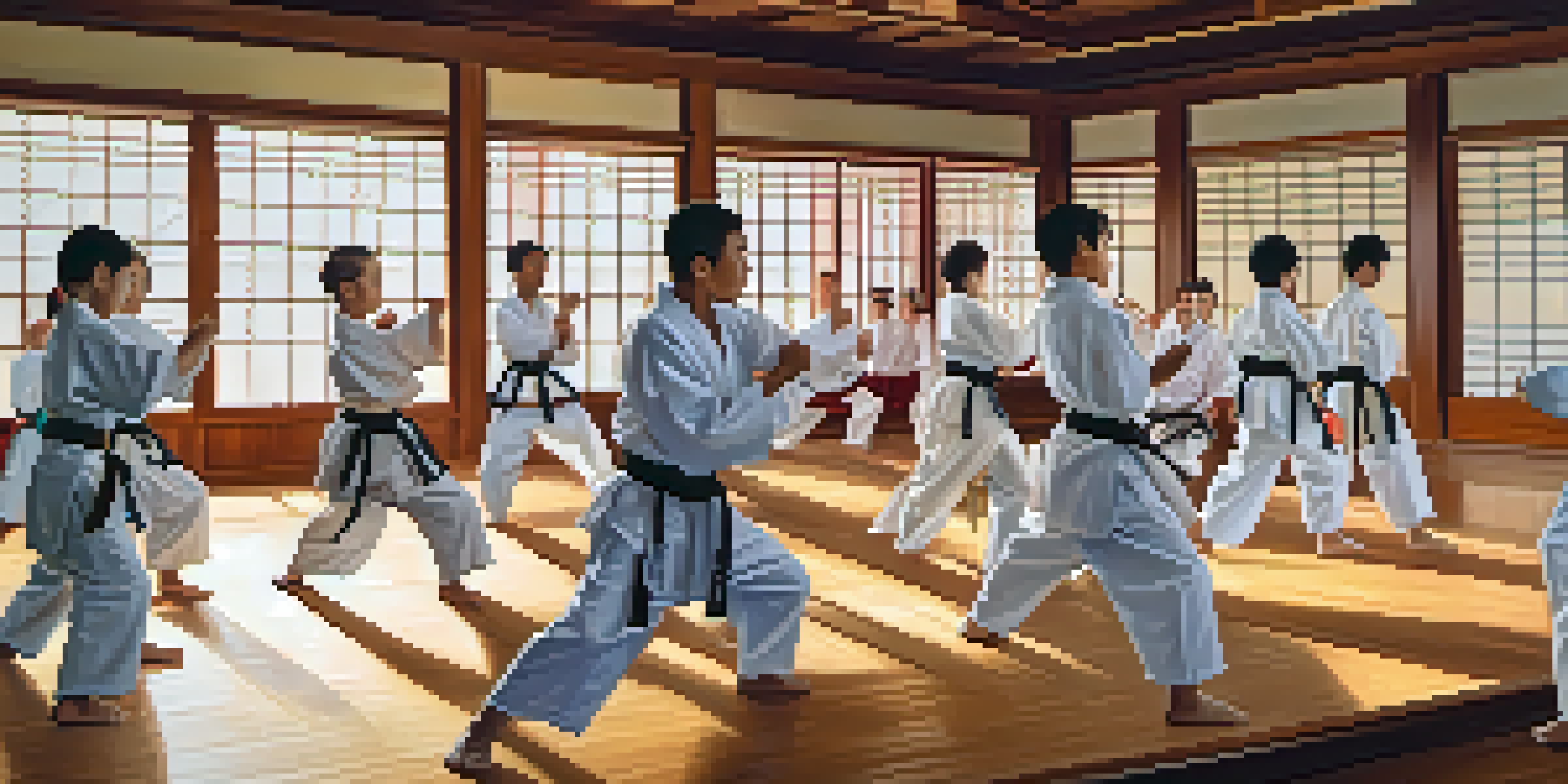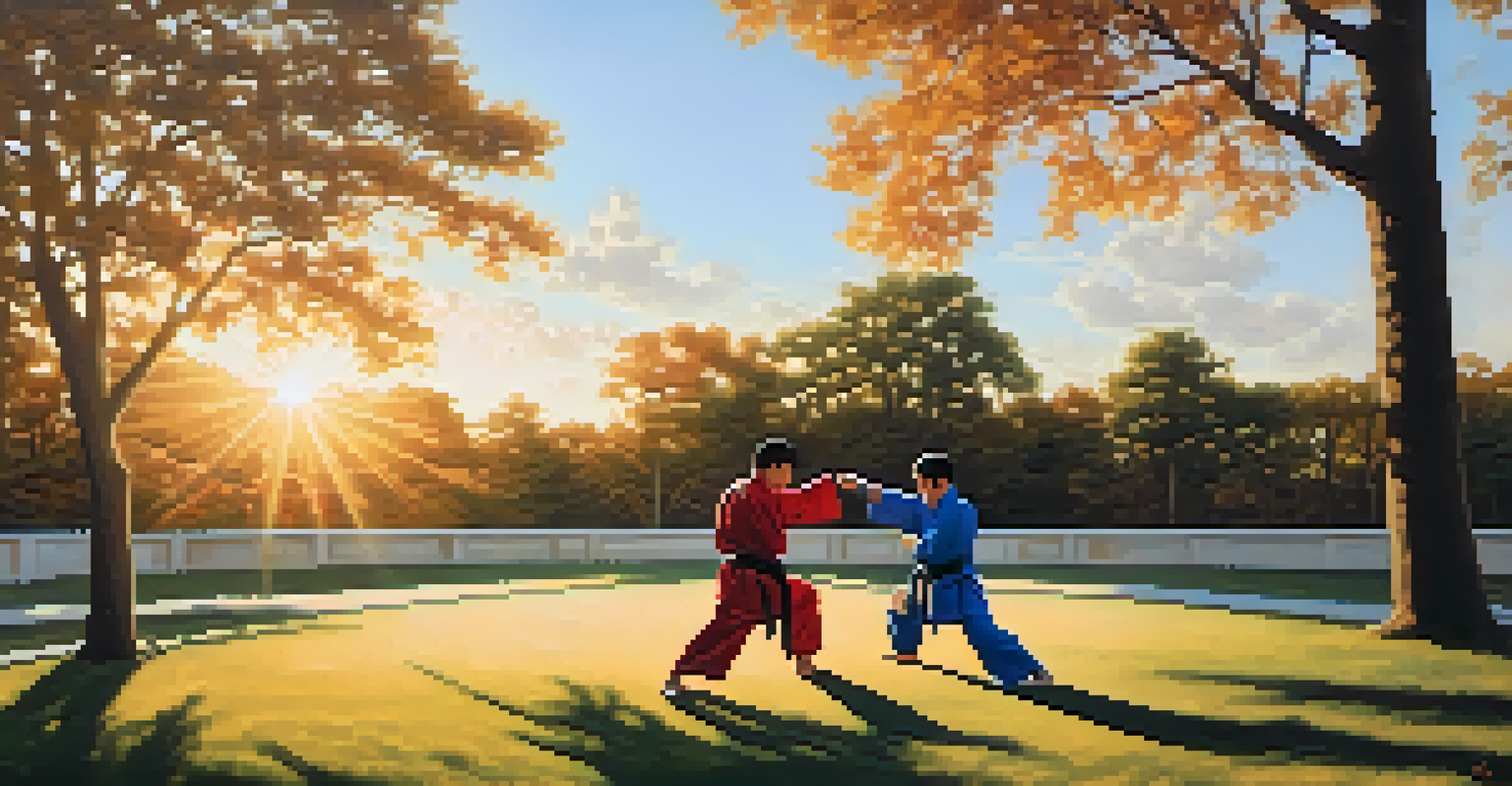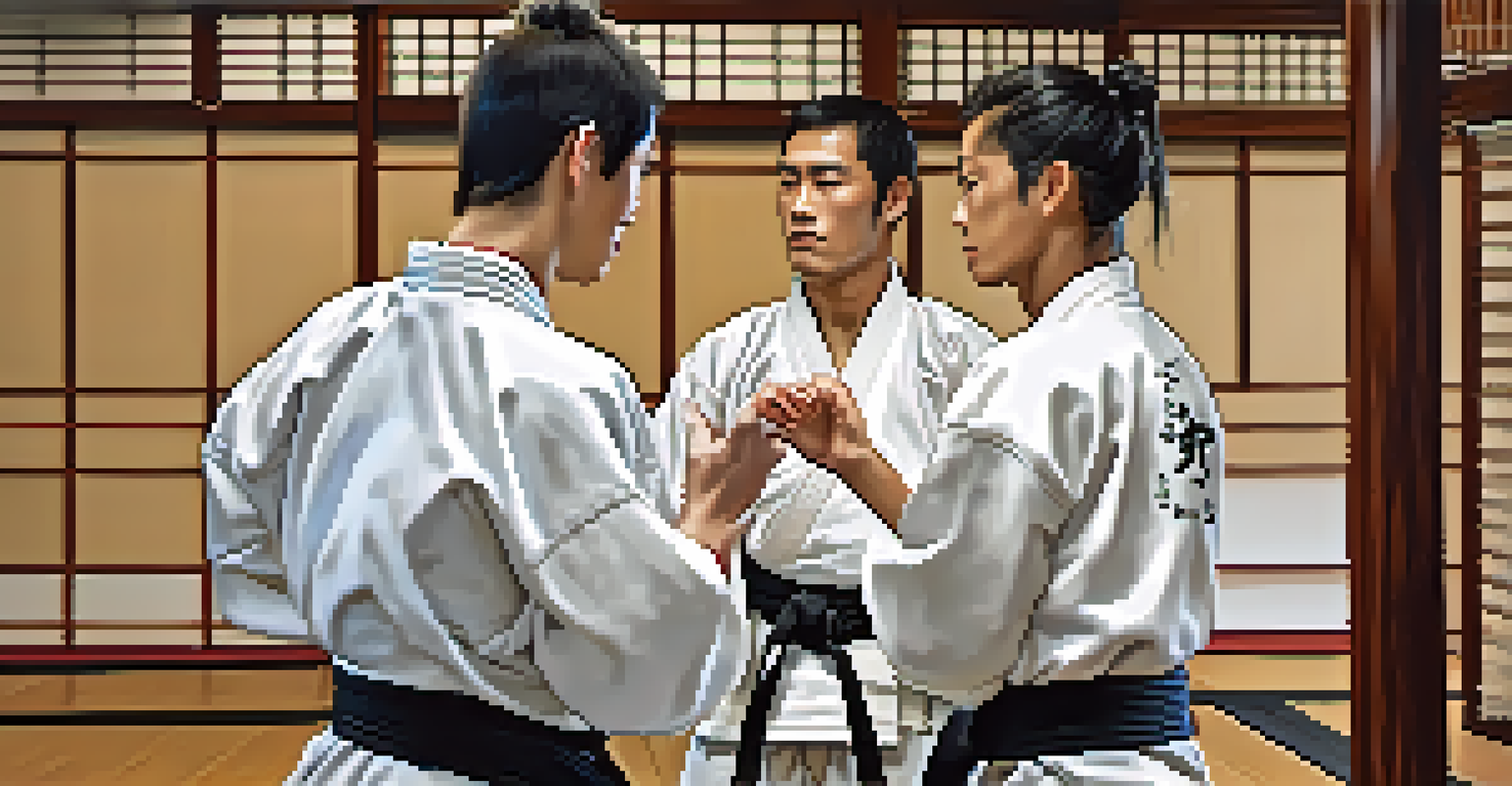Teamwork in Martial Arts: A Pathway to Better Social Skills

Understanding Teamwork in Martial Arts Training
Martial arts is often seen as an individual pursuit, but teamwork plays a crucial role in training. Practicing techniques with partners allows students to learn from each other and develop a deeper understanding of movements. This collaborative spirit fosters an environment where everyone is encouraged to grow, creating a sense of community within the dojo.
The strength of the team is each individual member. The strength of each member is the team.
In classes, students often partner up to practice drills, spar, or even compete in friendly matches. These interactions not only improve physical skills but also build trust and camaraderie among participants. As they work together, students learn to communicate effectively, which is essential for both martial arts and everyday life.
Ultimately, teamwork in martial arts teaches individuals that success is not solely about personal achievement, but about lifting each other up. This collective journey toward mastery helps forge lasting friendships and a supportive network, enhancing the overall experience for everyone involved.
The Role of Communication in Martial Arts Teams
Effective communication is a cornerstone of successful teamwork in martial arts. Whether it's giving feedback during practice or strategizing before a sparring session, clear communication helps partners align their efforts. This not only enhances the learning process but also reduces chances of injury during training.

Students learn to express their thoughts and feelings about techniques freely, which cultivates an open environment. As they share insights and constructive criticisms, they develop the ability to listen actively—a skill that translates well beyond the dojo. This exchange of ideas fosters respect and understanding among practitioners.
Teamwork Builds Strong Community
Collaboration in martial arts fosters a supportive environment, enhancing personal growth and friendships.
Moreover, communication in martial arts often involves non-verbal cues, such as body language and eye contact. Understanding these signals can significantly enhance a student's social interaction skills. This aspect of training prepares martial artists for various social settings, making them more aware and responsive in conversations.
Developing Conflict Resolution Skills Through Sparring
Sparring in martial arts provides a unique opportunity to develop conflict resolution skills. Each encounter is a mini negotiation, where practitioners must navigate different styles and strategies. This experience encourages participants to think critically and adapt quickly, cultivating flexibility in their problem-solving abilities.
Alone we can do so little; together we can do so much.
During sparring, students learn to handle both success and failure gracefully. When facing a more skilled opponent, they must learn to regroup and reassess their tactics rather than reacting defensively. This process teaches valuable lessons about humility and resilience, which are essential in managing conflicts in real life.
By practicing how to deal with challenging situations in a controlled environment, martial artists can approach conflicts outside the dojo with a calmer mindset. They learn that disagreements can be resolved through dialogue and understanding, leading to more peaceful interactions in their everyday lives.
Building Trust and Respect Among Training Partners
Trust is a fundamental component of effective teamwork in martial arts. Practitioners must rely on their partners to execute techniques safely and effectively. As students work together in drills and sparring, they build mutual respect, which strengthens their bond and enhances the learning experience.
When students trust each other, they feel more comfortable pushing their limits. This sense of security allows them to experiment with new techniques and learn from their mistakes without fear of judgment. The result is a more enriching training environment where everyone can thrive.
Communication Enhances Training
Effective communication during practice not only improves skills but also cultivates respect and understanding.
Moreover, the emphasis on respect in martial arts extends beyond physical interactions. Practicing with humility and acknowledging each other's strengths cultivates a positive atmosphere. This respect not only fosters better teamwork but also contributes to the development of healthier relationships outside the dojo.
Enhancing Empathy and Emotional Intelligence in Martial Arts
Martial arts training can significantly enhance empathy and emotional intelligence among practitioners. As students interact with diverse partners, they gain insights into different perspectives and experiences. This exposure broadens their understanding of others, fostering compassion and a sense of community.
Working closely with partners also helps students recognize and manage their own emotions. For instance, they learn to cope with frustration when they struggle with a technique or feel anxious before a sparring match. These experiences teach individuals how to navigate their feelings while also being considerate of others' emotional states.
Ultimately, the cultivation of empathy and emotional intelligence through martial arts not only benefits personal development but also enriches social interactions. Practitioners become more attuned to the feelings of those around them, leading to deeper connections and a more supportive environment both in and out of the dojo.
Teamwork and Leadership Skills in Martial Arts Classes
Martial arts classes often provide opportunities for students to take on leadership roles, which can enhance their teamwork skills. More experienced students may assist instructors or mentor beginners, fostering a sense of responsibility. This dynamic encourages practitioners to step outside their comfort zones and develop essential leadership qualities.
As students guide their peers, they learn to communicate effectively and provide constructive feedback. These experiences help them refine their own skills while empowering others. This reciprocal relationship not only strengthens the group but also instills confidence in those who take on leadership roles.
Conflict Resolution Through Sparring
Sparring teaches students to navigate challenges, developing resilience and critical thinking for real-life conflicts.
Moreover, the collaborative nature of martial arts training allows students to witness various leadership styles. They can observe what works well and what doesn’t, helping them identify their own approach to leadership. This exploration enhances their ability to work as part of a team while also preparing them for future leadership opportunities.
Creating Lasting Friendships Through Martial Arts Teamwork
One of the most rewarding aspects of teamwork in martial arts is the friendships that flourish. As students train together, they share challenges, victories, and experiences that forge strong bonds. These connections often extend beyond the dojo, leading to lasting friendships that enrich their lives.
The shared journey of learning martial arts creates a sense of belonging, making it easier to connect with others. Students develop a support system that encourages them through their martial arts journey and beyond. This community aspect is vital for personal growth and enhances the overall experience.

Additionally, social events, competitions, and seminars organized within the martial arts community provide opportunities for practitioners to strengthen these relationships. Celebrating achievements together and supporting one another during challenges fosters a tight-knit community. These friendships often last a lifetime, proving that teamwork in martial arts goes beyond physical training.
The Broader Impact of Martial Arts Teamwork on Society
The teamwork skills acquired through martial arts training can have a lasting impact on society. As individuals learn to communicate, resolve conflicts, and build empathy, they become more effective members of their communities. These skills can lead to more collaborative and harmonious environments both in personal and professional settings.
Furthermore, the values instilled through martial arts—such as respect, discipline, and perseverance—can inspire practitioners to contribute positively to society. Engaging in community service, mentorship programs, or local events can be a natural extension of their martial arts journey. This sense of responsibility helps create a culture of support and kindness.
In essence, the lessons learned in the dojo can ripple outwards, influencing society as a whole. By fostering teamwork and strong social skills, martial arts practitioners can lead by example, encouraging others to embrace cooperation and understanding in their interactions. This broader impact highlights the profound value of teamwork in martial arts, creating a legacy of positive change.